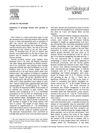 76 citations,
March 2005 in “Journal of Molecular Medicine”
76 citations,
March 2005 in “Journal of Molecular Medicine” Certain mice without specific receptors or mast cells don't lose hair from stress.
 66 citations,
July 2007 in “Journal of Molecular Medicine”
66 citations,
July 2007 in “Journal of Molecular Medicine” Stress increases certain chemicals in the skin and nerves, which might worsen skin conditions.
 375 citations,
July 2006 in “Journal of Investigative Dermatology”
375 citations,
July 2006 in “Journal of Investigative Dermatology” Stress can worsen skin and hair conditions by affecting the skin's immune response and hormone levels.
 194 citations,
March 2003 in “American Journal of Pathology”
194 citations,
March 2003 in “American Journal of Pathology” Stress stops hair growth in mice by causing early hair growth phase end and harmful inflammation through a specific nerve-related pathway.
4 citations,
September 2015 in “JAAD case reports” Substance P may play a role in the inflammation seen in keratosis follicularis spinulosa decalvans.
 67 citations,
July 2016 in “Reviews in Endocrine and Metabolic Disorders”
67 citations,
July 2016 in “Reviews in Endocrine and Metabolic Disorders” Stress can worsen skin conditions by affecting hormone levels and immune response.
 4 citations,
September 2021 in “Frontiers in allergy”
4 citations,
September 2021 in “Frontiers in allergy” The conclusion is that understanding the complex relationship between allergies, autoimmunity, and psychological factors is key to treating skin disorders with itching.
 January 2024 in “Journal of dermatology and skin science”
January 2024 in “Journal of dermatology and skin science” Topical aprepitant reduces skin rash and hair loss caused by cancer treatment.
 115 citations,
November 2004 in “Brain Behavior and Immunity”
115 citations,
November 2004 in “Brain Behavior and Immunity” Stress increases nerve fibers and immune cell activity in mouse skin, possibly worsening skin conditions.
 3 citations,
August 2018 in “Deleted Journal”
3 citations,
August 2018 in “Deleted Journal” Guasha changed rat skin appearance and blood vessels temporarily without affecting certain nerve proteins or fiber structure.
 101 citations,
January 1997 in “Journal of Investigative Dermatology Symposium Proceedings”
101 citations,
January 1997 in “Journal of Investigative Dermatology Symposium Proceedings” Nerves and chemicals in the body can affect hair growth and loss.
 108 citations,
July 2004 in “American Journal of Pathology”
108 citations,
July 2004 in “American Journal of Pathology” Stress increases a factor in mice that leads to hair loss, and blocking this factor may prevent it.
 53 citations,
January 2017 in “Skin appendage disorders”
53 citations,
January 2017 in “Skin appendage disorders” Botulinum toxin shows promise for various skin conditions but requires more research for confirmation and standardized use.
 11 citations,
June 2018 in “Sexual medicine reviews”
11 citations,
June 2018 in “Sexual medicine reviews” Stromal Vascular Fraction might help with male sexual dysfunction, but more research is needed to confirm its safety and effectiveness.
 September 2004 in “Experimental dermatology”
September 2004 in “Experimental dermatology” Melatonin directly affects mouse hair follicles and may influence hair growth.
 8 citations,
September 2003 in “Journal of dermatological science”
8 citations,
September 2003 in “Journal of dermatological science” Substance P helps hair grow longer and faster.
143 citations,
January 2004 in “Journal of Investigative Dermatology Symposium Proceedings” Alopecia areata is an autoimmune disease causing hair loss, treatable with immune-modulating drugs, and linked to genetics.
 127 citations,
December 2005 in “Experimental Dermatology”
127 citations,
December 2005 in “Experimental Dermatology” Stress can stop hair growth in mice, and treatments can reverse this effect.
 94 citations,
January 2016 in “Journal of the European Academy of Dermatology and Venereology”
94 citations,
January 2016 in “Journal of the European Academy of Dermatology and Venereology” Sensitive skin is often caused by nerve fibers and environmental factors, and can be managed with mild skincare and professional advice.
7 citations,
July 2021 in “The journal of investigative dermatology/Journal of investigative dermatology” Human skin can be reconnected to nerves using stem cells, which may help with skin health and healing.
 6 citations,
December 2019 in “BMC Complementary and Alternative Medicine”
6 citations,
December 2019 in “BMC Complementary and Alternative Medicine” Alcohol extract from Vernonia anthelmintica seeds may help treat stress-related hair loss.
 15 citations,
August 2020 in “American Journal of Pathology”
15 citations,
August 2020 in “American Journal of Pathology” Insulin helps heal corneal wounds and nerves in diabetic mice by activating the Wnt signaling pathway.
 125 citations,
September 2001 in “The FASEB Journal”
125 citations,
September 2001 in “The FASEB Journal” Stress can cause hair loss by negatively affecting hair follicles and this effect might be reversed with specific treatments.
 159 citations,
December 2007 in “American Journal of Pathology”
159 citations,
December 2007 in “American Journal of Pathology” Stress-related substance P may lead to hair loss and negatively affect hair growth.
 77 citations,
July 2020 in “Cell”
77 citations,
July 2020 in “Cell” Muscles and nerves that cause goosebumps also help control hair growth.
 July 2022 in “Biomedicines”
July 2022 in “Biomedicines” 4-Aminopyridine improves skin wound healing and tissue regeneration by increasing cell growth and promoting nerve repair.
61 citations,
October 2011 in “Experimental dermatology” Scalp itching is common and hard to diagnose due to the complex nerve structure of the scalp.
3 citations,
July 2023 in “International journal of molecular sciences” Stress may contribute to hair loss in alopecia areata by affecting immune responses and cell death in hair follicles.
December 2020 in “Galen Medical Journal” Alopecia patients have more mast cells in their scalps, especially in severe cases and older age, with alopecia areata showing the highest increase.
 22 citations,
August 1999 in “Experimental Dermatology”
22 citations,
August 1999 in “Experimental Dermatology” Certain drugs can cause early hair growth in mice by affecting the nerves.
























